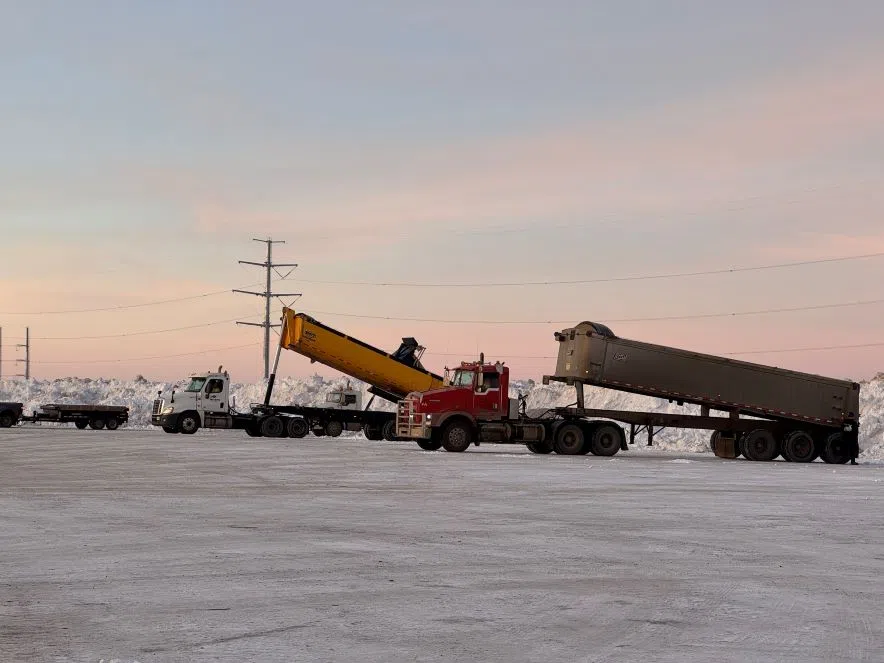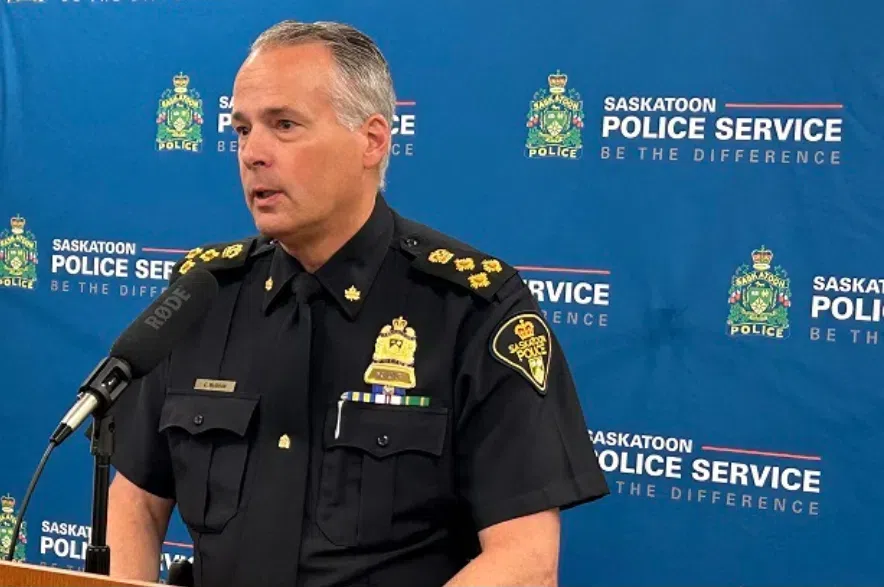Saskatoon’s police chief is defending a traffic blitz which saw traffic tickets handed out to several truck drivers hauling snow after a storm.
On November 29, as the city was still digging out after a major weekend snowstorm, the Saskatoon Police Service and Saskatchewan Highway Patrol participated in a joint education and enforcement project related to unsecured loads, after getting complaints from the public on the issue.
Read More:
- Saskatoon cop coaches mother as she gives birth inside vehicle
- ‘Grandparent scam’ returns again to Saskatoon, police say
- Emergency crews launch South Saskatchewan River search for man
In total, 20 tickets were handed out under a law which requires all bulk loads not fully contained to have a tarp or another appropriate material such as a canvas, wire mesh or netting over the top to prevent material from becoming dislodged. The rule has been in place since June 1.
Speaking on The Evan Bray Show on Tuesday, Police Chief Cam McBride said he feels more than enough time has passed for drivers to understand the new legislation.
Listen to the full interview with McBride:
“With a piece of legislation that’s been on the books now for several months, we would anticipate that operators of equipment would know and understand that new legislation this time of year. As soon as the gravel is on the road and the winter tires are on the vehicles, those tires are picking up rocks and lots of people are experiencing broken windshields, chipped paint, all kinds of damage to their vehicles, and that is true also for equipment hauling,” he explained.

Truckers hauling snow out of the city say they were ticketed by police for driving with unsecured loads during a recent traffic blitz. (Alex Brown/650 CKOM)
“Whether it be gravel, snow, anything like that can come loose and fall from the vehicle. We wanted to ensure that the individuals doing that kind of work are abiding by the legislation creating a safe road experience for all road users and, unfortunately, a few people did get tickets for that.”
Some truck drivers who spoke with 650 CKOM claimed that city trucks were not being issued tickets, despite the snow in the back not being secured.
McBride didn’t comment on specific tickets, but reiterated that the rules are the same for all truck drivers.
“We’re looking to make sure that the vehicle is equipped with the proper protective equipment and that it’s actually being used in the moment,” he said.
Record police budget approved
Just over a week ago, Saskatoon’s city council approved a record budget of $141.4 million for the city’s police service.
Part of the increased budget will go towards air support expansion, which McBride noted has brought significant benefits.
The police service will also have increased patrol resources and a dedicated warrant enforcement team thanks to the increase.
The chief said the investment will benefit his department.
“We have the opportunity to phase in 37 new front-line police officers over two years. We’re looking for 24 in 2025, and what that’ll do is it’ll allow us to both incorporate more front-line staffing when it comes to call response and some of that proactive, community-based policing,” McBride said.
He suggested the extra money allows the police service to take part in a couple of new initiatives as well.
“One is a new approach to investigating intimate-partner violence, and the second is with regard to warrant enforcement – basically answering the coroner’s inquiry or the coroner’s recommendation that came out of the James Smith incident that we consider the implementation of a warrant enforcement team, and we’re doing that,” McBride explained.
The chief said the warrant enforcement team will help “ensure that violent offenders who are wanted are removed from the community and entered into the justice system, so that that process can flow effectively and efficiently.”
McBride added that the team will help ensure charges are answered more quickly, particularly due to the case of R v. Jordan, which requires charges to be brought to trial within a reasonable time frame.
“We want to make sure that people face justice, but we don’t want to risk those charges of being stayed as a result of extended time periods,” McBride said.







